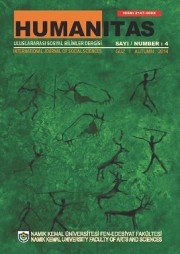PETER ACKROYD’S CHATTERTON:HISTORY VS FICTION
PETER ACKROYD’S CHATTERTON:HISTORY VS FICTION
Author(s): Author Not SpecifiedSubject(s): Literary Texts
Published by: Namık Kemal Üniversitesi Fen-Edebiyat Fakültesi
Keywords: Peter Ackroyd; Chatterton; Historiography; Postmodern Fiction; Biography; Historiographic Metafiction.
Summary/Abstract: Postmodern theory regards history as an imaginative construction of the past, and suggests that historiography undergoes the same process as fiction writing. The historian, just like a novelist, selects some past events in accordance with her/his stated or unstated purpose while omitting others which s/he finds irrelevant to the message that s/he aims to convey to the reader. S/He interprets these events subjectively by taking her/his ideological commitment into consideration, and using her/his imagination constructs a meaningful whole by filling the gaps between these events. In this sense, history cannot truly reflect past reality, and therefore cannot claim objectivity. In his novel Chatterton (1987), Peter Ackroyd employs a working method strikingly similar to that of a historian. He creates a fictional version of the famous poet Thomas Chatterton’s life focusing on the gaps in his biography, and filling these gaps with imaginary events, many of which seem to contradict the official history regarding the poet. While writing the poet’s personal history, he also highlights the process of historiography with the purpose of making his reader aware of the blurring boundary between history and fiction. Thus, the aim of this paper is to explore possible similarities between historiography and fiction writing within the frame of Ackroyd’s Chatterton, and to examine the novel in the light of Linda Hutcheon’s conceptualization of “historiographic metafiction.”
Journal: Humanitas - Uluslararası Sosyal Bilimler Dergisi
- Issue Year: 2/2014
- Issue No: 04
- Page Range: 61-74
- Page Count: 13
- Language: Turkish

